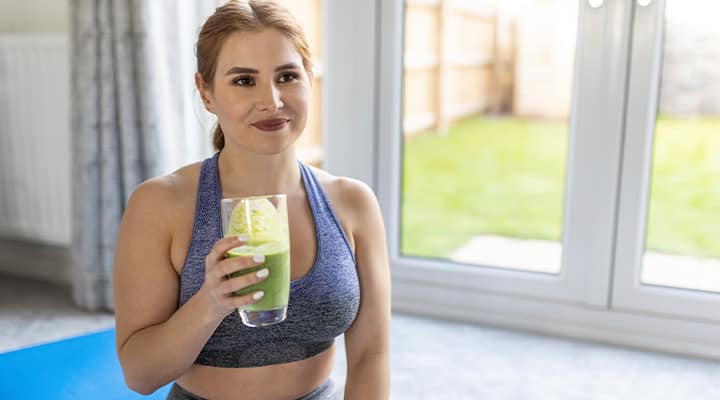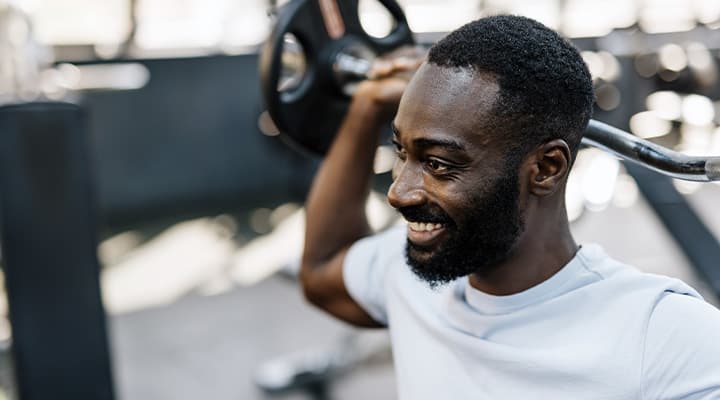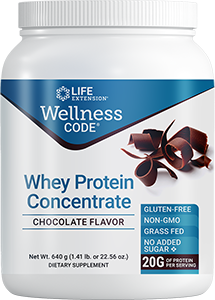
Collagen vs. Protein Powder: Which Is Best for You?
Published: September 2024
Wherever you are on your path to healthier living, you've probably considered adding a collagen or protein powder supplement to your daily routine. After all, these supplements are all the rage among celebs, influencers, and maybe even your workout buddy or fitness instructor. But does the science support the hype?
We're happy to report that in this case, yes, the research for both of these products is solid. Whether you're after a healthy glow, muscle support, or overall well-being, you might find the support you need from collagen or protein powder supplements—and in some cases, you might even want to take both.
Let's dig into the ins and outs of collagen and protein so you can understand their benefits and make the right choice for your lifestyle.
Should you take collagen or protein powder?
Your choice will depend on your goals, dietary needs and overall health. If you want to support an active lifestyle and build muscle mass and strength, go with a protein powder. If you want to promote skin health and joints, collagen is the way to go. And if you want to support both, you can take both! (Caveat: before making any changes to your nutrition or supplement routine, speak with your physician or nutritionist.)
Let's explore the difference between the two and their unique health benefits.
Collagen: for skin and joints
When you hear "collagen," you probably think of smooth, glowing skin. And while skin health is a primary benefit, collagen also supports joint health. Collagen is the most abundant protein in your body. Yes, you read that correctly: collagen is a protein. However, it's not a complete source of protein, meaning that it doesn't provide all the essential amino acids your body needs for optimum health, nine of which your body can't produce on its own (more on that later).
Collagen contains three amino acids: glycine, proline and hydroxyproline. You get different types and forms of collagen from various food sources. The most abundant types of collagen are:
Type I collagen
: This type of collagen is dense and makes up 90% of your body's collagen. Type I collagen gives structure to your skin, bones, tendons and ligaments.Type II collagen
: This type of collagen is associated with tissues that experience compressive or "push" loads. It's concentrated in your cartilage, the connective tissue that supports joints, at the insertion between two bones. Think knees and elbows.Type III collagen
: This is another type of structural collagen. It exists in high concentrations in your skin, muscles, arteries and organs.
You can get collagen from animal sources or get the same amino acid profile (particularly the three amino acids in collagen) from specific plant sources.
Hydrolyzed collagen (or collagen peptides)
: This is a popular and effective form of collagen, and it comes from animal sources. Its composition makes it easier for your body to absorb and use. Hydrolyzed collagen is great for helping reduce the visible signs of skin aging. A meta-analysis of 14 studies, including 967 participants, revealed that supplementation with hydrolyzed collagen for up to 12 weeks helped promote the skin's hydration and elasticity compared to placebo. And other studies have found that hydrolyzed collagen can help stimulate collagen production and promote joint comfort.Pro collagen or "vegan" collagen
: There are no plant-based sources of collagen, but there are supplements that give your body the building blocks it needs to make collagen. You can find vegan pro collagen formulas that contain the same amino acid makeup as human type I collagen and produce results as impactful as those of collagen peptides.
While you can get collagen by eating certain foods (bone broth, beef, pork, organ meats, fish, and eggs, to name a few), collagen powders are also a great way to supplement your nutrition. If drinking a glass of collagen supplements doesn't sound like your cup of tea, there are dozens of recipes you can try to add more collagen to your routine in tasty ways—from coffee drinks to cookie dough bites.
Protein: for muscles & more
Protein is an essential macronutrient. It makes up your muscles, bones, skin, hair, enzymes, and everything in your body and tissues. It consists of 20 amino acids, which are the building blocks of protein. Your body can naturally produce 11 amino acids from scratch (non-essential amino acids), but the remaining nine (essential amino acids)—histidine, isoleucine, leucine, lysine, methionine, phenylalanine, threonine, tryptophan and valine—must come from the foods you eat.
Protein powders will provide all nine essential amino acids, making it a complete source of protein. Those essential amino acids are vital for bodily functions like protein synthesis, tissue repair, nutrient absorption and much more. Many complete sources of protein come from animal sources (fish, beef, poultry, dairy and pork). But you'll find vegan and vegetarian-friendly options in whole sources of soy such as tofu, edamame, tempeh and miso.
Plant foods like legumes, nuts, seeds, whole grains and vegetables lack one or more essential amino acids. So, to ensure you're getting a complete amino acid profile, it's a good idea to consume a variety of plant sources. A classic example of this complementary effect is rice and beans.
It's no surprise that for years, athletes have long recognized the power of protein for supporting muscle strength maintenance, whether in capsules, bars or powder form. Protein powder helps to build and support muscle mass as well as promote immune health. The good news is that protein powders aren't just for athletes! When you crack the code on how to choose the perfect protein supplement, you'll notice the following benefits:
- Maintain muscle mass and build strength
- Support healthy, sustained muscle function
- Promote immune system health and longevity
- Promote muscle growth when combined with resistance training
Adding a protein powder to your daily habits is a proactive "whey" to complement your active lifestyle and support your hardworking muscles (and the rest of you).
Pick Your Protein
There are many types, textures, and flavors to choose from in the protein powder world. Here are the top five you'll want to explore.
Whey protein
: It's the most popular type of protein and is considered to be the most effective powder for building muscle. Whey is a milk byproduct that enters your bloodstream faster than other proteins and boasts the highest level of the amino acid leucine, which gives your muscles the fuel they need to power through a workout. If increasing muscle mass is your goal, you'll want to take it within an hour after exercise.Casein
: Like whey, this is a protein found in milk. The biggest difference between casein and whey is that casein takes a little longer to digest. Some athletes take it before bed to get the full benefits. Whey protein, on the other hand, absorbs quickly, which is why it's often taken right after a workout.Soy protein
: This is a complete protein made from ground soybeans that have been dehulled and defatted. It is moderately easy to digest and contains greater amounts of glutamine and arginine amino acids, which may help support immune function. It's considered the most effective plant-derived source for building or maintaining muscle.Pea protein
: Peas are a rare exception among legumes because they are a complete source of protein, although they have lower levels of certain amino acids like methionine. Pea protein powder is rich in leucine and lysine, making it an excellent alternative to soy protein powders.Egg white protein
: This is an excellent choice if you want or need to avoid dairy. While it's not quite up to par with whey or casein in terms of how it supports muscle protein synthesis, it's still a great option in a post-workout or meal-replacement smoothie.
Can I take collagen and protein powder together?
Absolutely! Collagen contributes to your daily protein intake goal (although it shouldn't be the sole source as it is an incomplete protein). And of course, protein powder contributes to your overall protein intake—it's a macronutrient for a reason!
Sources recommend getting at least 0.8 grams of protein per kilogram of body weight daily, though protein needs will vary based on gender, weight, height, age and level of physical activity. For example, a person who weighs 150 pounds should get a minimum of about 55 grams of protein from their diet. Protein intake should increase if you are very active.
Remember to chat with your doctor or nutritionist before adjusting your supplement routine or adding something new to your daily nutrition. Once you choose the best supplement for you, follow the directions on the label and stay consistent with your intake.
Can you build muscle with collagen protein?
Could collagen protein help you build muscle? Never say never, but realistically, if building muscle is your goal, your best chance at achieving this is with a protein powder. That's because collagen is not a complete protein.
There are plenty of tasty ways to add protein to your meals, for breakfast, lunch, and dinner, whether you follow a vegetarian diet or not.
Let's recap: When it comes to choosing between collagen and protein powder, there's no need to play favorites. They're both beneficial to your health. Want to support your muscle mass and increase muscle growth? Try protein powder. Want to promote radiant skin and joint health? Reach for collagen powder. Want it all? Take both!
References
- Benito-Ruiz P, et al. "A Randomized Controlled Trial on The Efficacy And Safety of a Food Ingredient, Collagen Hydrolysate, for Improving Joint Comfort." Int J Food Sci Nutr. 2009. https://pubmed.ncbi.nlm.nih.gov/19212858/
- Buckley MR, et al. "Distributions of types I, II and III collagen by region in the human supraspinatus tendon." Connect Tissue Res. 2013. https://www.ncbi.nlm.nih.gov/pmc/articles/PMC6056177/
- Campos LD, et al. "Collagen Supplementation in Skin and Orthopedic Diseases: A Review of the Literature." Heliyon. March 2023. https://pubmed.ncbi.nlm.nih.gov/37064452/
- Dewi DAR, et al. "Exploring the Impact of Hydrolyzed Collagen Oral Supplementation on Skin Rejuvenation: A Systematic Review and Meta-Analysis." Cureus. December 2023. https://www.ncbi.nlm.nih.gov/pmc/articles/PMC10773595/
- Kerksick CM, et al. "ISSN Exercise & Sports Nutrition Review Update: Research & Recommendations." Journal of the International Society of Sorts Nutrition. August 2018. https://jissn.biomedcentral.com/articles/10.1186/s12970-018-0242-y
- Lin YK, et al. "Oral Supplementation of Vegan Collagen Biomimetic Has Beneficial Effects on Human Skin Physiology: A Double-Blind, Placebo-Controlled Study." Journal of Functional Foods. January 2024. https://www.sciencedirect.com/science/article/pii/S1756464623005558?via%3Dihub
- Proksch E, et al. "Oral Supplementation of Specific Collagen Peptides Has Beneficial Effects on Human Skin Physiology: A Double-Blind, Placebo-Controlled Study." Skin Pharmacol Physiol. 2014. https://pubmed.ncbi.nlm.nih.gov/23949208/
- Shanthakumar P, et al. "The Current Situation of Pea Protein and Its Application in the Food Industry." Molecules. August 2022. https://www.ncbi.nlm.nih.gov/pmc/articles/PMC9412838/
- "Collagen." Cleveland Clinic. May 2022. https://my.clevelandclinic.org/health/articles/23089-collagen
- "How Much Protein Do You Need Every Day?" Harvard Medical School. June 2023. https://www.health.harvard.edu/blog/how-much-protein-do-you-need-every-day-201506188096
- "Protein." Harvard T.H. Chan School of Public Health. https://nutritionsource.hsph.harvard.edu/what-should-you-eat/protein/
- "What Are Complete Proteins?" Cleveland Clinic. December 2022. https://health.clevelandclinic.org/do-i-need-to-worry-about-eating-complete-proteins
Always be in the know!
Access the latest deals, wellness news, expert health tips & more!












